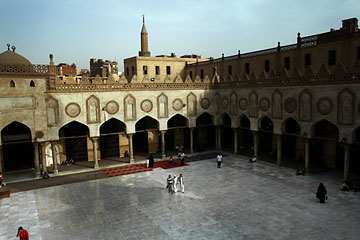
Cairo's al-Azhar Mosque, founded in the 10th century, remains the focal point of the university
(4 of 4)
Islamist Ascendancy
Fahmi's nightmare may already be incubating within the walls of al-Azhar — certainly among the student body, but increasingly among the faculty. Under Mubarak, Islamists within al-Azhar were held in check by state security, who, students note, barred Salafists from its dorms and Brotherhood professors from rising above departmental head. But they are flourishing now. On almost every other campus in Egypt, Brotherhood chapters lost badly in recent student elections, reflecting the plummeting approval ratings for the party's governance, which has polarized the country. At al-Azhar, however, both the Brotherhood and Salafists carried large margins. "There's the Salafi current that's stronger, and people are attracted to it more than the Brotherhood. They have the credibility," says Mohammad Hassan Ali Ibrahim, an agriculture student from the Nile Delta, pausing as he does his homework on a patch of grass between classes.
Thanks to al-Azhar's hands-off commitment to academic freedom, there are significant numbers of Salafi-minded scholars on campus, says Walead Mosaad, an American-born moderate cleric who teaches theology in the mosque. Others at al-Azhar say the university's moderate leadership, closeted in its ivory tower, has lost touch with the Egyptian street, where extremist strains of Islam have grown stronger in recent years: Salafist parties won 25% of the vote in the first post-Tahrir parliamentary election.
On campus, what strikes a visitor is a magnanimity no longer evident elsewhere in Egyptian political life. On Cairo's clogged streets, young men wade through traffic holding aloft signs reading HONK IF YOU HATE THE BROTHERHOOD. But on an April morning, the comity that al-Azhar's leaders have taken pains to encourage in national politics appears well established on campus. Outside the college of engineering, a reporter's search for a victim of food poisoning turns up not only Mohammad Eid, 23, ("There was a lot of vomiting") but representatives of all the main factions, leaning together against a parked car before class and getting along famously.
The bacterial chicken really did throw open a window on the politics surrounding al-Azhar. President Morsi's conspicuous visit to hospitalized students was interpreted as an encouraging pat on the shoulder to the protesters who embarrassed el-Tayeb. And when the Egyptian military announced it would buy al-Azhar a new kitchen, that was a reminder that the institution has a powerful friend, one with a lot of tanks. ("Azhar is a priority," an armed-forces spokesman told Egypt Daily News in April, "as it is a highly respected institution.") "I have a comment," says Mohsen Fikry, 24, raising his hand. He wears the beard of a Salafi. "We appreciate the army — however, only in the military field, defending the country."
"That's the Islamist groups!" says Ahmed Shogaa, 22, a secular student who throws his arm around the Salafi, laughing. "We love the army!" Amid the joshing, only the Muslim Brotherhood representative hangs back, true to the group's underground roots. The Brothers are famous for their patience. A couple of blocks away, gathering his books from the grass as he heads for class, agriculture student Ibrahim smiles at the question of al-Azhar's going fundamentalist. "In the old regime, they wouldn't let them live in the dormitories," he says. Now the former outcasts are winning elections. "Nothing comes all at once."
